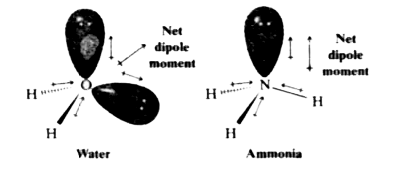Compare the dipole moments of water and ammonia.
Unshared pairs of electrons make large contributions to the dipole moments of water and ammonia. Because an unshared pair has no other atom attached to it to partially neutralize its negative charge, an unshared electron pair contributes a large moment directed away from the central atom. (The O-H and N-H moments are also appreciable.)

Topper's Solved these Questions
- FAMILIES OF CARBON COMPOUNDS: FUNCTIONAL GROUPS AND INTERMOLECULAR FORCES BOOK - MS CHOUHANCHAPTER - FAMILIES OF CARBON COMPOUNDS: FUNCTIONAL GROUPS AND INTERMOLECULAR FORCES EXERCISE - ADDITIONAL OBJECTIVE QUESTIONS ( Single Correct Choice Type )
16 Videos
- FAMILIES OF CARBON COMPOUNDS: FUNCTIONAL GROUPS AND INTERMOLECULAR FORCES BOOK - MS CHOUHANCHAPTER - FAMILIES OF CARBON COMPOUNDS: FUNCTIONAL GROUPS AND INTERMOLECULAR FORCES EXERCISE - ADDITIONAL OBJECTIVE QUESTIONS ( Integer Type )
4 Videos
- CONJUGATED UNSATURATED SYSTEMSBOOK - MS CHOUHANCHAPTER - CONJUGATED UNSATURATED SYSTEMSEXERCISE - Additional Objective Questions (Multiple Correct Choice Type)
4 Videos
- GENERAL ORGANIC CHEMISTRYBOOK - MS CHOUHANCHAPTER - GENERAL ORGANIC CHEMISTRYEXERCISE - LEVEL- 1
1 Videos
Similar Questions
Knowledge Check
The bond angle and dipole moment of water respectively are :
A109.5∘,1.84DB104.5∘,1.84DC107.5∘,1.56DD102.5∘,1.56D
Compare the dipole moments of the compounds in the following pairs.
HF,HCl
View SolutionCompare the dipole moments of the compounds in the following pairs.
CHCl3,CCl4
View SolutionThe dielectric permittivity of gaseous argon at standard conditions is 1.00054. Find the dipole moment of an argon atom in an electric field of 10 kV/m. Compare with the dipole moment of a water molecule.
View SolutionThe dielectric permittivity of gaseous argon at standard conditions is 1.00054. Find the dipole moment of an argon atom in an electric field of 10 kV/m. Compare with the dipole moment of a water molecule.
View SolutionCompare dipole moment of the following


CH3−CH2−C=CH,CH3−C=C−CH3
View SolutionCompare dipole moment of the following


CH3−CH2−C=CH,CH3−C=C−CH3
View SolutionThe Dipole moment of Benzene is ………..
View Solution
